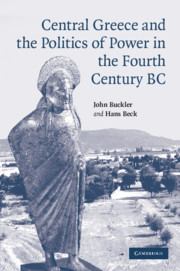Book contents
- Frontmatter
- Contents
- List of maps
- Preface
- Acknowledgments
- List of abbreviations
- Prologue
- Part I ALLIANCE
- Part II HEGEMONY
- Part III DOMINATION
- Chapter 14 Thebes, Delphi, and the outbreak of the Sacred War
- Chapter 15 Pammenes, the Persians, and the Sacred War
- Chapter 16 Philip II, the Greeks, and the King, 346–336 BC
- Chapter 17 A note on the battle of Chaeronea
- Chapter 18 Philip II's designs on Greece
- Epilogue
- Glossary
- References
- Index
Chapter 18 - Philip II's designs on Greece
from Part III - DOMINATION
Published online by Cambridge University Press: 22 September 2009
- Frontmatter
- Contents
- List of maps
- Preface
- Acknowledgments
- List of abbreviations
- Prologue
- Part I ALLIANCE
- Part II HEGEMONY
- Part III DOMINATION
- Chapter 14 Thebes, Delphi, and the outbreak of the Sacred War
- Chapter 15 Pammenes, the Persians, and the Sacred War
- Chapter 16 Philip II, the Greeks, and the King, 346–336 BC
- Chapter 17 A note on the battle of Chaeronea
- Chapter 18 Philip II's designs on Greece
- Epilogue
- Glossary
- References
- Index
Summary
The career of Philip presents many intriguing problems, but few more intractable than the question of his ultimate goals, a source of numerous interpretations and speculation. This offering is yet another attempt to determine and then to understand Philip's aspirations in Greece. If Philip ever formed any definite plans for acquiring the hegemony of Greece, no trace of them has survived. Even his ambitions in Persia have been the subject of numerous conjectures. The very silence surrounding these matters is significant for it makes an incontestable explanation of them impossible. That fact is one of Philip's more enigmatic legacies. It is sufficient here to examine, insofar as possible in the space available, what objectives Philip wished to achieve in Greece.
Demosthenes labored under no such doubts. He believed that Philip was bent on the defeat of Athens, and as early as 349, he used the First Olynthiac (1, 3) to voice his concerns to his fellow countrymen: “Most of all there is this to fear. This cunning and terrible man makes use of his accomplishments, yielding on points when he must, threatening (and he certainly appears to mean it) on others. He slanders us and our inactivity. He fosters and takes for himself anything of value.” On a later occasion he (6, 2) warned that Philip's ambitions extended to all of Greece.
- Type
- Chapter
- Information
- Publisher: Cambridge University PressPrint publication year: 2008

